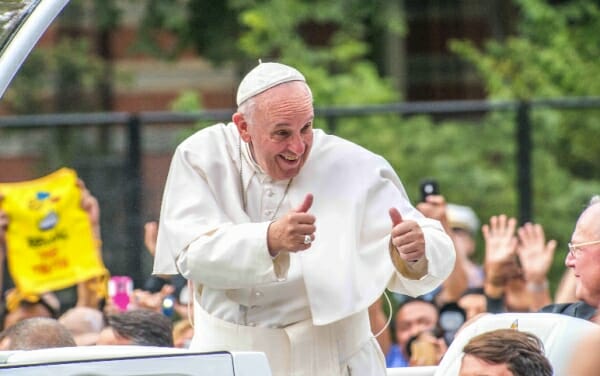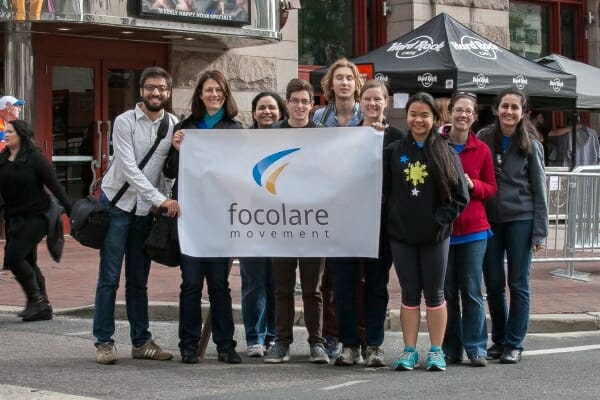
Photo © Renato Araujo
The Pope concluded his visit
in the city of Philadelphia where the Declaration of Independence and the Consitution of the United States had been written. It was a historic visit that had a deep effect the people of the United States. At Independence Hall, a central landmark,with his usual smile Pope Francis clarified that he is niether right nor left. He highlighted the importance of religious liberty and dialogue in an increasingly multicultural society, emphasising what is positive in the people of the United States: “We remember the great struggles that led to the abolition of slavery, the extension of the vote, the growth of the workers movement and the progressive efforts to eliminate every form of racism and prejudice directed towards successive waves of new Americans,” the Pope said. He extended
special greetings to Hispanic immigrants from a Pope who was the son of an immigrant family
: “You bring with you many talents to your new land. Never be ashamed of your traditions,” he told an applauding crowd. He mentioned the fervid faith and family deep family values of the Hispanic population: “As you make your contribution, you will not only establish yourselves here, but you will help to renew society from within.” Jennifer Huertas from Puerto Rico, who has been living in the United States for two years: “The Pope asks us not to forget our roots, and to recognise the uniqueness of every individual. Yes, diversity isn’t something bad, because every human being is unique.”
A few hours later, he attended the conclusion of the World Meeting of Families with young and older families, singles, men and women Religious and priests who had prepared the city with particular care. After listening to six testimonies from couples and families who recounted how they tried to overcome their struggles through faith in God, the Pope delivered
a very animated homily, highlighting the importance of family life. A boy had asked him what God was doing before He created the world: “God loved, because God is Love,” the Pope answered.
His words enchanted the half million people who had waited for hours along Benjamin Franklin Parkway. “It was fantastic to see the Pope,” says Thea from Los Angeles. “I especially liked when he pointed out that God had not placed Jesus in the midst of a Kingdom, but in a family. Nowadays, very few people visit their parents, many of my friends live like that and it’s painful. It’s not always easy in my own family either, it is often hard to listen deeply to one another, but the Pope’s words will help me to face this difficulty.” On the following day, the crowds continued to wait patiently to hear the Pope, singing and dancing as they waited in long lines at security checkpoints. Never loosing their cool, they smiled and thanked the police officers for their work. “My son turned 2 today, but my wife and I thought that this was a once in a lifetime opportunity that couldn’t be missed,” one security officer said.

Photo © Andrea Re
Around a million people attended the Mass and, another million watched it on television. Francis greeted everyone and blessed children before the Mass began with Scripture readings in Spanish and Vietnamese. The liturgical readings of that Sunday contained strong words, where Moses and Jesus both affirmed that even people who do not belong to their group could perform miracles in the Lord’s name. “We must not be scandalised by the freedom of God,” the Pope told the crowd. Then he invited families to perform small gestures of love and compassion: a warm meal after a long workday, a warm embrace: “Love is shown in the small things,” he said. This means being “prophets,” overcoming the “scandal of a love that is restricted and petty” and
he sent a clear message to the Church that must accept diveristy and trust the action of the Holy Spirit.
He also had other significant encounters: with
prisoners, and
the survivors of sexual abuse by the clergy; regarding which the Pope said “God weeps.” It is like a Black Mass, “there are no excuses.”
His six-day visit was a breath of fresh air, not only for the American Catholic Church, but for the whole country. The Pope highlighted the cultural values of the land beginning from the country’s founding, and he invited Americans to be faithful to those values: love, family, the dignity of every human being, caring for the poor.
While leaving the United States, he sent a message on Twitter: “With my gratitude, may Christ’s love continue to guide the American people! #GodBlessAmerica.”
Susanne Janssen and Sarah Mundell – Living City Magazine
0 Comments